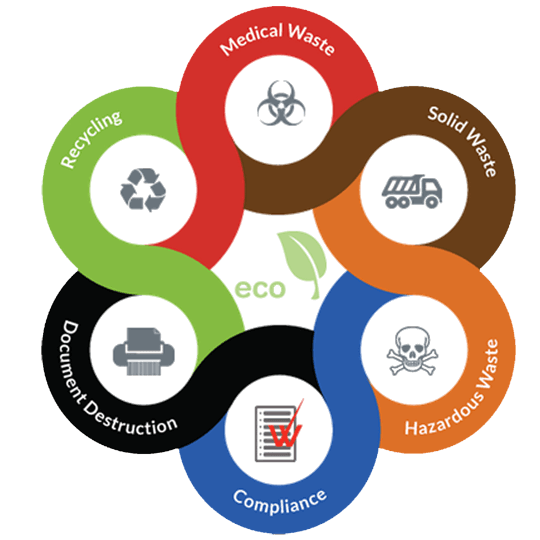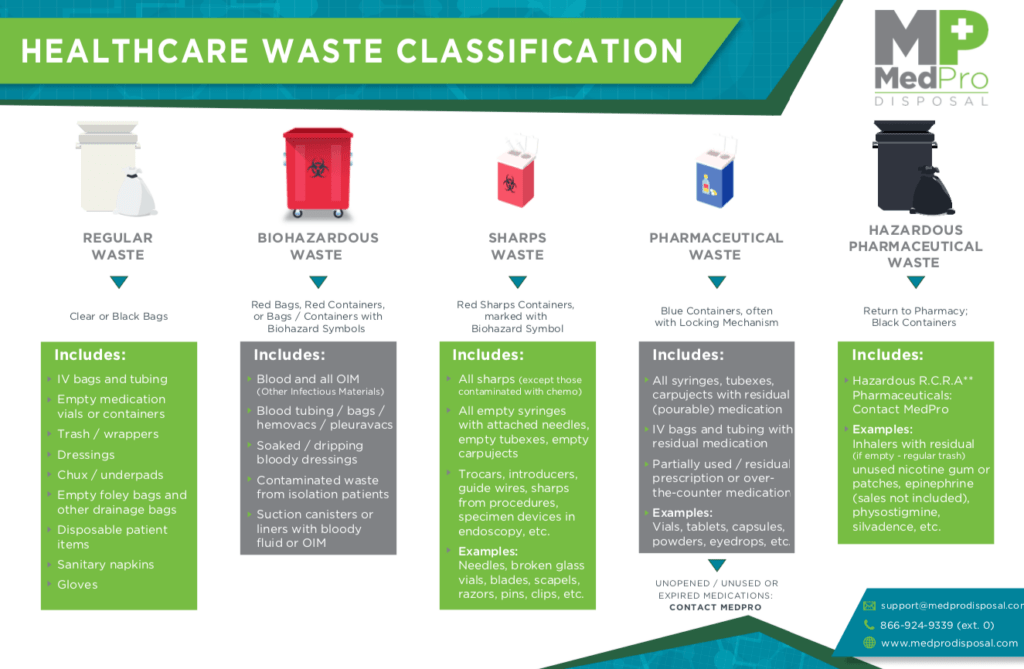Safe and Efficient Medical Waste Removal: Your Trusted Environmental Companion
Wiki Article
Effective Approaches of Medical Waste Disposal
Reliable methods of clinical garbage disposal are important in maintaining public health and wellness and ecological safety. Clinical waste, including sharps, pathological waste, and pharmaceutical waste, have to be handled and gotten rid of effectively to stop the spread of infections and protect the setting. This needs adherence to stringent laws and the implementation of specialist waste management practices.Correct partition of medical waste, risk-free and protected storage space, effective therapy and sanitation techniques, and environmentally-friendly disposal options are vital components of a reliable medical waste disposal system. Professional waste management services play a crucial duty in making sure compliance with policies and minimizing the risks related to inappropriate disposal. By using these methods, healthcare centers can add to a much safer and cleaner atmosphere while securing the wellness of the neighborhood.
Appropriate Segregation of Medical Waste
Proper partition of clinical waste is crucial for ensuring the safe and efficient disposal of these possibly hazardous materials. Medical waste refers to any type of waste created throughout health care tasks, such as hospitals, centers, labs, and research centers. It includes a variety of materials, such as made use of needles, syringes, contaminated dressings, expired or unused medications, and biological materials.By setting apart clinical waste, health care centers can decrease the risk of infections, injuries, and environmental contamination. The procedure includes classifying waste into various types, such as sharps, transmittable waste, pharmaceutical waste, and non-hazardous waste. Each kind requires particular handling, product packaging, and disposal techniques to stop direct exposure to healthcare workers, waste administration workers, and the public.
To make certain correct segregation, healthcare centers ought to develop clear standards and give ample training to personnel. This consists of enlightening employees on the various waste groups, correct product packaging methods, and the usage of suitable containers - WasteX Medical Waste Disposal. In addition, clear signs and color-coding systems can be implemented to promote the identification and partition of different waste types
Safe and Secure Storage of Medical Waste
Safe and safe and secure storage of medical waste is crucial for preserving the stability and control of possibly harmful products. Correct storage space not just shields medical care employees and the basic public from direct exposure to unsafe materials but also avoids environmental contamination.To make certain risk-free storage, clinical centers ought to adhere to specific standards. Waste ought to be stored in puncture-resistant and watertight containers that are identified suitably - medical waste removal service.
Correct segregation of medical waste is also important for safe storage space. Various types of waste, such as sharps, contagious products, and pharmaceutical waste, must be divided to stop cross-contamination. This segregation can be achieved with making use of color-coded containers or containers.
Routine tracking and inspection of the storage area are vital to recognize any prospective dangers or violations. This consists of monitoring for indications of damage or wear and tear in the containers, guaranteeing correct air flow, and keeping track of temperature level and humidity levels.
Reliable Treatment and Disinfection Approaches

One frequently made use of therapy approach is autoclaving, which involves subjecting the waste to high-pressure steam at temperatures above 121 degrees Celsius. This process properly kills microorganisms and ruins contagious representatives, rendering the waste safe for additional disposal. One more approach is incineration, which entails burning the waste at high temperatures. Incineration not just gets rid of bacteria but also minimizes the waste quantity through combustion.
Chemical sanitation is another reliable approach for dealing with medical waste. This technique includes using disinfectants such as chlorine compounds, phenolic compounds, or hydrogen peroxide to kill or inactivate pathogens (WasteX Medical Waste Disposal). Chemical sanitation is usually made use of for liquid waste, such as research laboratory examples or bodily fluids
In recent years, alternate treatment approaches such as microwave disinfection, irradiation, and organic treatment have actually also gotten attention. These techniques offer benefits such as decreased ecological impact and power consumption contrasted to conventional approaches.
Environmentally-friendly Disposal Options
In the world of medical waste disposal, taking into consideration environmentally-friendly choices is important. Healthcare centers produce a considerable amount of waste, including infectious products, drugs, and chemicals, which can pose significant dangers to human health and wellness and the atmosphere if not managed effectively. There are several environmentally-friendly disposal alternatives available that can assist minimize these dangers.
One such alternative is recycling. Reusing clinical waste involves setting apart and refining certain products for reuse or repurposing. For instance, plastics, glass, and metal containers can be recycled, lowering the demand for brand-new products and minimizing the quantity of waste sent out to landfills. In addition, some healthcare centers have applied recycling programs for sure medical tools or devices, further reducing waste generation.
One more environmentally-friendly disposal choice is waste-to-energy conversion. This method entails transforming clinical waste right into power through procedures like incineration or anaerobic digestion. medical waste removal service. Incineration, when done properly with innovative innovations, can create energy while minimizing harmful exhausts. Anaerobic food digestion, on the various other hand, breaks down natural waste in the lack of oxygen, creating biogas that can be made use of for electrical power or warm generation.

Benefits of Expert Waste Administration Solutions
One considerable benefit of professional waste monitoring services is the boosted effectiveness in disposing and taking care of of medical waste. Medical care facilities create a considerable amount of waste that consists of hazardous products, such as sharp objects, contaminated products, and potentially contagious waste. medical waste disposal. Inappropriate handling and disposal of medical waste present serious health and wellness threats to employees, individuals, and their website the general public. By using specialist waste management solutions, medical care facilities can make certain that all medical waste is dealt with and gotten rid of properly, reducing the threat of contamination and the spread of diseases.Expert waste management services use trained and experienced personnel who are well-informed about the guidelines and guidelines for clinical waste disposal. They have accessibility to customized tools and tools that allow them to handle different kinds of clinical waste safely and effectively. These services also have reputable treatments and procedures in position to guarantee that waste is segregated, packaged, carried, and disposed of in compliance with local, state, and federal laws.
In addition, specialist waste administration services can provide healthcare facilities with comprehensive waste monitoring solutions. They can offer services such as waste collection, disposal, transport, and therapy, tailored to the certain demands and requirements of the center. This removes the burden of managing waste inside, permitting health care team to concentrate on supplying quality person treatment.
Final Thought
To conclude, effective methods of clinical waste disposal involve appropriate segregation, secure storage, therapy and disinfection, and environmentally-friendly disposal alternatives (WasteX Medical Waste Disposal). These approaches make sure the secure handling and administration of clinical waste, avoiding the spread of infections and shielding the atmosphere. Specialist waste management services play a crucial function in applying these techniques and making certain compliance with laws. By following these techniques, healthcare centers can add to a much safer and much healthier environment for both clients and the community.Clinical waste, consisting of sharps, pathological waste, and pharmaceutical waste, need to be dealt with and disposed of appropriately to avoid the spread of infections and protect the setting.Proper segregation of clinical waste, safe and secure and safe storage space, effective therapy and sanitation approaches, and environmentally-friendly disposal options are crucial parts of an efficient clinical waste disposal system. The process entails categorizing waste into different kinds, such as sharps, transmittable waste, pharmaceutical waste, and non-hazardous waste. By making use of expert waste management services, medical care centers can guarantee that all medical waste is managed and disposed of appropriately, lessening the danger of contamination and the spread of diseases.
Specialist waste monitoring services employ experienced and knowledgeable employees that are experienced about the laws and standards for clinical waste disposal.
Report this wiki page